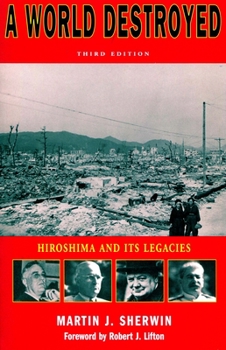A World Destroyed: Hiroshima and Its Legacies
Select Format
Select Condition 
Book Overview
Continuously in demand since its first, prize-winning edition was published in 1975, this is the classic history of the development of the American atomic bomb, the decision to use it against Japan, and the origins of U.S. atomic diplomacy toward the Soviet Union. In his Preface to this new edition, the author describes and evaluates the lengthening trail of new evidence that has come to light concerning these often emotionally debated subjects...
Format:Paperback
Language:English
ISBN:0804739579
ISBN13:9780804739573
Release Date:August 2003
Publisher:Stanford University Press
Length:375 Pages
Weight:1.10 lbs.
Dimensions:0.9" x 5.5" x 8.7"
Customer Reviews
2 ratings
The Destroyer of Worlds
Published by Thriftbooks.com User , 20 years ago
The atomic bombings of Hiroshima and Nagasaki forever changed the world landscape. The Nuclear Age came to be and a new god arose out of the ashes. The atomic bomb and nuclearism (the worshipful embrace of atomic weapons) came to rule the world in the vacancy left by the Second World War. The bomb and atomic energy came to be viewed as deity because in the words of Robert J. Lifton, "what other than a deity could be capable of destroying the world?" "But a deity also must be capable of ruling and protecting the world, even of keeping the world going?" (From the foreword). The bomb was embraced with both fear and wonder as that of a deity capable of both governing and destroying the world in a single action. It is this deity's rise to power, which is here chronicled by Martin J. Sherwin. The complex political history is detailed from the beginnings of the Manhattan Project to the destruction of both Hiroshima and Nagasaki. Offering a fair treatment of all involved Sherwin provides the political backdrop to the creation of the atomic legacy, which continues to this day. In this work he deals with the scientists' struggles with the military and subsequent use of their work toward military ends. These "soldiers out of uniform" began the race for the atomic bomb against Germany yet towards the end of their work many became increasingly aware of the moral ramifications for unleashing such a devastating device upon humanity. The burning question which continually came up to both scientists, political advisors and the world leaders involved (FDR, Truman, and Churchill) was, "What role would the atomic bomb take in the postwar world?" This question often failed to illicit response and only came to its answer after the destruction of both Hiroshima and Nagasaki. Sherwin spends much time on the relationship of the Soviet Union (Stalin) to the bomb. In the end the choice was to not let the Soviets in on the secret of S-1 (the military designation of the bomb) and Sherwin highlights how many saw this as negatively affecting the postwar relationship between an already fragile wartime cooperation between England, the United States and the Soviet Union. While Truman sought to use the bomb as leverage (at the Potsdam Conference) against both the Japanese and the Russians it seems to have worked for the Japanese but failed for the Russians. Japan surrendered shortly after the bombing of two of its cities, but the Soviet Union became hardened to the U.S. and American-Soviet relations quickly deteriorated. Could the Cold War have been averted if Roosevelt and Truman only included Stalin in on the knowledge of the bomb? The atomic bomb brought about the end of the Second World War but brought about the beginning of the arms race and new war of nuclearism. While it was meant to be a means of peace during the war, the atomic bomb became a means of clouding the future of the postwar world. In conclusion, Sherwin quotes Henry Adams whom a century befo
Martin Sherwin
Published by Thriftbooks.com User , 22 years ago
To the above post, I would reply that to leave the reader asking questions is not a shortcoming at all. Rather, continually questioning and revising conclusions is what historical study is all about. The first mark of a good historian is the ability to ask the right questions--and this task is not nearly as easy as it may seem, as evidenced by the plethora of bad histories out there. And that a historian succeeds in prompting and inspiring the reader to ask his or her own questions after putting down the book can only be considered an exceptional quality. I would seriously question any historian who claimed to have all the complete answers to all of his or her questions.






